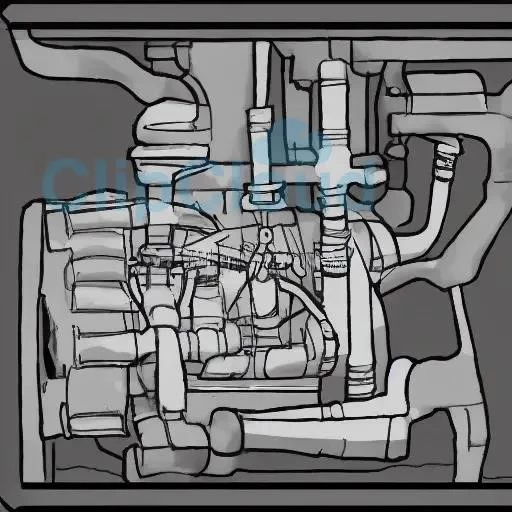The evolution of car engine technologies has been nothing short of remarkable, transforming vehicles from noisy, inefficient machines to sophisticated powerhouses of engineering․ Modern engines are a complex blend of mechanical ingenuity and cutting-edge electronics, constantly striving for greater efficiency, reduced emissions, and enhanced performance․ This continuous pursuit of improvement has led to a diverse range of innovations, each addressing different aspects of the driving experience and environmental responsibility․ The drive for cleaner, more powerful, and reliable car engine technologies is a never-ending quest;
Internal Combustion Engine (ICE) Advancements
While electric vehicles are gaining traction, the internal combustion engine continues to dominate the market․ Significant advancements are being made to improve its efficiency and reduce its environmental impact․
Direct Injection
Direct injection systems inject fuel directly into the combustion chamber, allowing for more precise control over fuel delivery․ This leads to:
- Increased fuel efficiency
- Reduced emissions
- Improved power output
Variable Valve Timing (VVT)
VVT systems optimize the timing of valve opening and closing based on engine speed and load․ This results in:
- Enhanced low-end torque
- Improved high-end horsepower
- Better overall fuel economy
Alternative Engine Technologies
Beyond the traditional ICE, several alternative engine technologies are emerging to address the growing demand for sustainable transportation․
Hybrid Engines
Hybrid engines combine an internal combustion engine with an electric motor to improve fuel efficiency and reduce emissions․ These systems often utilize regenerative braking to capture energy that would otherwise be lost․
Electric Engines
Electric engines are powered by electricity and produce zero tailpipe emissions․ They offer instant torque and a smooth, quiet driving experience․ Battery technology is constantly improving, leading to longer ranges and faster charging times․
Fuel Cell Engines
Fuel cell engines use hydrogen to generate electricity, producing only water as a byproduct․ While still in development, they hold the potential for a truly zero-emission transportation future․
Comparison of Engine Technologies
| Technology | Fuel Efficiency | Emissions | Performance | Complexity |
|---|---|---|---|---|
| Internal Combustion Engine (ICE) | Moderate | Moderate to High | Good | Moderate |
| Hybrid | High | Low | Good | High |
| Electric | Very High | Zero Tailpipe Emissions | Excellent | Moderate |
| Fuel Cell | High | Zero Emissions | Good | High |
The Future of Car Engines
The future of car engines is likely to be a diverse landscape, with a mix of internal combustion engines, hybrids, electric vehicles, and fuel cell vehicles․ The specific mix will depend on factors such as technological advancements, government regulations, and consumer preferences․ As technology advances, expect to see more refined and efficient iterations of existing technologies, as well as the emergence of entirely new concepts․ The ongoing research and development in the realm of engine technology guarantees a future with vehicles that are not only more powerful and enjoyable to drive, but also significantly more environmentally friendly․
Ultimately, the progress of car engine technologies will be driven by the pursuit of a more sustainable and efficient transportation future․
But will internal combustion engines ever truly reach peak efficiency, or will they eventually be completely replaced by electric or hydrogen power? Could we see advancements in synthetic fuels that allow ICEs to operate with significantly reduced carbon footprints? What about the integration of artificial intelligence to optimize engine performance in real-time based on driving conditions?
Materials Science and Engine Design
Are we on the cusp of a materials revolution that could revolutionize engine design? Will new alloys or composites allow engines to withstand higher temperatures and pressures, leading to greater efficiency? Could 3D printing enable the creation of engine components with complex geometries that were previously impossible to manufacture? How will these advancements impact the size and weight of engines?
Aerodynamics and Engine Cooling
Is there more that can be done to improve engine cooling efficiency? Can we optimize airflow around and through the engine to reduce drag and improve overall vehicle aerodynamics? Will innovative cooling technologies, such as liquid cooling or advanced heat exchangers, become more commonplace?
Noise Reduction and Vibration Control
Can we further reduce engine noise and vibrations to create a quieter and more comfortable driving experience? Will active noise cancellation technologies become more prevalent in vehicles? What innovative methods can be employed to dampen engine vibrations and improve overall vehicle refinement?
The Role of Government Regulations
How will increasingly stringent emissions regulations impact the development of car engine technologies? Will stricter fuel economy standards accelerate the transition to electric vehicles? Could government incentives encourage the adoption of alternative fuel technologies, such as hydrogen fuel cells? Will these regulations foster innovation, or stifle the development of traditional engines?
Consumer Preferences and Market Trends
Will consumer preferences continue to shift towards electric vehicles, or will there be a resurgence in demand for high-performance internal combustion engines? How will factors like charging infrastructure availability and battery range affect the adoption of electric vehicles? Could the rising cost of gasoline influence consumer choices and drive the demand for more fuel-efficient engine technologies? Are consumers ready to embrace new engine technologies, or will familiarity and tradition continue to drive purchasing decisions?

